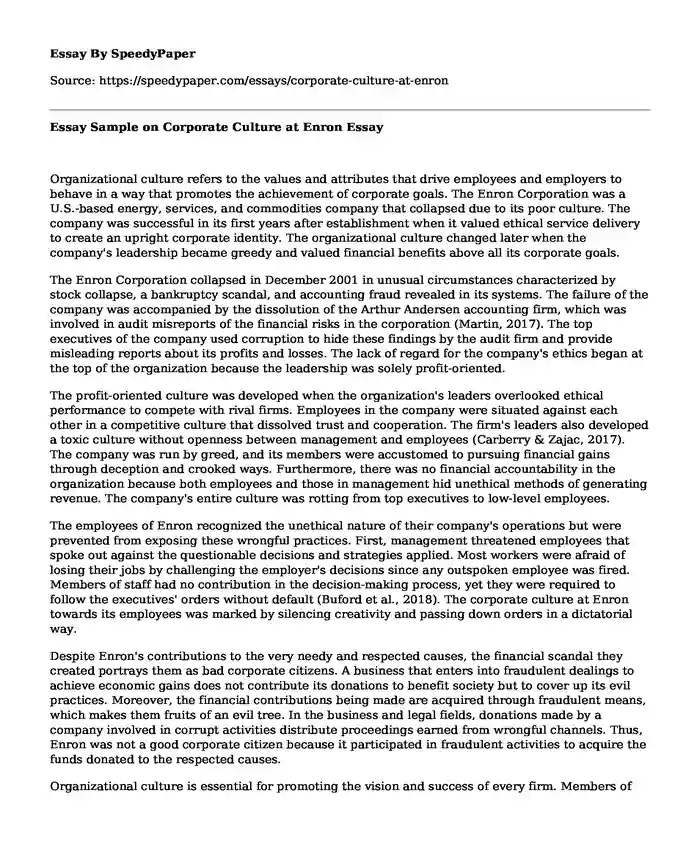
| Type of paper: | Case study |
| Categories: | Financial analysis Organizational culture Crisis management |
| Pages: | 3 |
| Wordcount: | 635 words |
Organizational culture refers to the values and attributes that drive employees and employers to behave in a way that promotes the achievement of corporate goals. The Enron Corporation was a U.S.-based energy, services, and commodities company that collapsed due to its poor culture. The company was successful in its first years after establishment when it valued ethical service delivery to create an upright corporate identity. The organizational culture changed later when the company's leadership became greedy and valued financial benefits above all its corporate goals.
The Enron Corporation collapsed in December 2001 in unusual circumstances characterized by stock collapse, a bankruptcy scandal, and accounting fraud revealed in its systems. The failure of the company was accompanied by the dissolution of the Arthur Andersen accounting firm, which was involved in audit misreports of the financial risks in the corporation (Martin, 2017). The top executives of the company used corruption to hide these findings by the audit firm and provide misleading reports about its profits and losses. The lack of regard for the company's ethics began at the top of the organization because the leadership was solely profit-oriented.
The profit-oriented culture was developed when the organization's leaders overlooked ethical performance to compete with rival firms. Employees in the company were situated against each other in a competitive culture that dissolved trust and cooperation. The firm's leaders also developed a toxic culture without openness between management and employees (Carberry & Zajac, 2017). The company was run by greed, and its members were accustomed to pursuing financial gains through deception and crooked ways. Furthermore, there was no financial accountability in the organization because both employees and those in management hid unethical methods of generating revenue. The company's entire culture was rotting from top executives to low-level employees.
The employees of Enron recognized the unethical nature of their company's operations but were prevented from exposing these wrongful practices. First, management threatened employees that spoke out against the questionable decisions and strategies applied. Most workers were afraid of losing their jobs by challenging the employer's decisions since any outspoken employee was fired. Members of staff had no contribution in the decision-making process, yet they were required to follow the executives' orders without default (Buford et al., 2018). The corporate culture at Enron towards its employees was marked by silencing creativity and passing down orders in a dictatorial way.
Despite Enron's contributions to the very needy and respected causes, the financial scandal they created portrays them as bad corporate citizens. A business that enters into fraudulent dealings to achieve economic gains does not contribute its donations to benefit society but to cover up its evil practices. Moreover, the financial contributions being made are acquired through fraudulent means, which makes them fruits of an evil tree. In the business and legal fields, donations made by a company involved in corrupt activities distribute proceedings earned from wrongful channels. Thus, Enron was not a good corporate citizen because it participated in fraudulent activities to acquire the funds donated to the respected causes.
Organizational culture is essential for promoting the vision and success of every firm. Members of Enron from the top to bottom levels of operation were responsible for developing a progressive corporate culture. The dictatorial leadership, accompanied by the restrictive culture at Enron, prevented the firm from overcoming financial misconduct because selfish interests guided everyone. Enron's case study shows how important it is to maintain a positive corporate culture that equips all stakeholders with the values required for progress.
References
Buford, M. A., Buford, M. A., & Ballenger. (2018). Bold Followership. Palgrave Macmillan.
Carberry, E., & Zajac, E. (2017, January). How US Corporations Changed Executive Compensation after Enron: Substance and Symbol. In Academy of Management Annual Meeting Proceedings 2017 (Vol. 1).
Martin, J. (2017). Organizational Culture and How Enron Did it Wrong. Retrieved 22 November 2019, from https://www.linkedin.com/pulse/organizational-culture-how-enron-did-wrong-jason-martin-mba/
Cite this page
Essay Sample on Corporate Culture at Enron. (2023, Mar 02). Retrieved from https://speedypaper.com/essays/corporate-culture-at-enron
Request Removal
If you are the original author of this essay and no longer wish to have it published on the SpeedyPaper website, please click below to request its removal:
- Food Control Essay Example
- Free Essay Describing the Acts of Kindness Project
- Free Essay Sample about the Black Lives Matter Movement
- Essay Sample: Normative Political Theories and Disaster Management
- Literary Analysis Essay of Alice Walker's "Everyday Use", Free Sample
- Essay Sample on How to Know That Your Message Reached the Intended Audience
- Compare and Contrast Essay on Job Announcements for a Financial Manager Position
Popular categories




